#very mrs rochester in the attic
Explore tagged Tumblr posts
Note
https://www.tumblr.com/nalyra-dreaming/762934616351031296/theres-something-ive-struggled-to-understand
I always wondered about what the anon asked as well. Care to share your reading?
I more or less agree with the OP's answer that it's about Louis not wanting to be connected to Madeleine, but I think the motivation is probably different?
My read is that episode is really about Louis trying to let Claudia go, and that he's acknowledging the complete dissolution of the family unit. After all, if Lestat and Louis' turning was a wedding, and Lestat turning Claudia was Lestat giving Louis a daughter, Louis knowing that Madeleine and Claudia are a love match in a lot of ways turns him into the father giving his daughter away on her wedding day. Turning Madeleine isn't about love for him, nor about having a child, it's about seeing his daughter as a grown woman ready to start her own family without him.
The acknowledgement of Claudia as an adult is not one he's ever genuinely made before - something s2 makes very clear with Claudia having to pose as his daughter again in wartorn Europe, Baby Lulu being the female diminutive of Louis, and then, even more tellingly, with Dreamstat explicitly referring to her as such - and while she's been pulling away all season and trying to force Louis into independence, it's been something he's pretty clearly very resentful of.
Madeleine though forces his hand, because Claudia finally choosing a companion splinters the last leg of their family unit for good. Madeleine is a stranger to him in the way many children's spouses are strangers to their in-laws, and Louis doesn't have Lestat to share the weight of that with anymore (and he doesn't have Lestat because of Claudia, which deepens the resentment). All he knows - which he discovers through turning her - is that she loves his daughter, and I take Louis trying to get the blood out of himself as a bitter and wounded sort of wedding gift.
He wants to give them their freedom, but at the same time the depression he experienced as an empty nester in New Orleans has already set in, he has to live with the fact that his attempt at a family has ended, and Armand's never been as satisfying to take things out on as Lestat was, to say nothing of the fact that he - as Assad put it - doesn't give a fuck about Claudia. At least Lestat gave a fuck, even if he usually gave the wrong sort of fucks, haha.
So yeah, I think it's a sort of attempt at a resentful wedding present, in a lot of ways, to try and give her this thing without being a part of it, and a real attempt to let Claudia go as his daughter.
Little does Louis know though, Claudia's the gothic heroine of this story, and she's not ever going to get out of her father's (or step-father's) house.
#i almost made this a lot longer haha#but i'm trying to keep these a little shorter#but yeah i probably have another post in me about the shifting power dynamics of s2#and in particular the way a lot of s2 - and this episode in particular - is about establishing lestat's power and pervasiveness#and then completely undermining it#like lestat's back! oh wait no he's not he's just in louis' head#oh this is lestat's theatre! wait no its not its a different venue with only one person who ever even knew him#oh lestat's fully bankrolling the theatre though! oh wait no he's not because they had to downsize and the banker can't even get in contact#oh lestat's back for real this time! oh wait he's being used as a prop#lestat haunts the season but he's also completely impotent in it#he's puppeteered by everyone#first louis with dreamstat then armand in his retelling then the coven at the trial#and there's this interesting way they all weaponise him against each other while he's completely powerless in it#it's very rebecca by daphne du maurier#very mrs rochester in the attic#and i think does a very neat job of recontextualising louis even outside of his re-rememberings as being a character with more power than#he likes to admit to and a patriarchal force in claudia's life#iwtv asks#amc interview with the vampire#louis asks#claudia asks#madeleine asks#iwtv 2.06
18 notes
·
View notes
Text
in hindsight one of my more insane responses to finishing jane eyre was being like hmm I didn't like this rochester fella. not my kind of love interest. kind of wild he was presented like such a great dude. you know who WOULDN'T lock a wife in an attic? lan wangji. that's right. #notlanwangji. but was I wrong tho
#sorry I have an all-consuming need to compare every single positively-presented love interest to lwj#as if its MY FAULT#can you fucking imagine if mr. darcy had a woman he LOCKED in his attic. and lizzie was just like damn guess there's nothing to be done :/#I really thought rochester would be like. a criticized character. like I really thought LOCKING A WOMAN IN HIS ATTIC would be a moral#dealbreaker for the perfect miss eyre. like I fully didn't expect him to be romanticized. I was like well heathcliff is an antihero#surely the WIFE IMPRISONER will be too. nope. hes a great guy. happy ending. you know what's so disgusting#bertha's very existence is the impediment to their happy ending. she has to die and since she killed herself all's well. a mentally ill#black woman's suicide aftera decade of inhumane imprisonment is the key that unlocks this wealthy white couple's happy ending. what the FUC#cor.txt#suicide tw
8 notes
·
View notes
Text
Picture of Jane Eyre and Mr. Rochester. The caption is "me and the ugly short baddie I pulled by being autistic." Either of them could have written it. Do you see my vision.
#sorry i'm so worreid i'm going to get called out for making up autistic jane eyre now. okay she's not VERY autistic it's a difficult#argument to make it's more a headcanon due to small moments far outnumbered by allistic jane eyre moments ok#autistic mr. rochester is like completely made up even more btw. but like. obviously.#jane eyre#classic literature#none of my classmates are going to understand this book like i do when school starts (60% joking)#we're reading wide sargasso sea too so it's all going to be attic wife discourse#classic lit#classical literature#i said this#i keep going back and forth on if there's more evidence of her being autistic or allistic#like am i just seeing what i want to see. because there ARE neurotypical moments from Jane and Mr. Rochester. but i just love#the idea of them getting along so well because they autisticly get each other. full disclosure i am allistic. i think.#but either way Autistic Jane Eyre is a cool headcanon/interpretation i enjoy#jane and mr rochester are an iconic double short couple this is simply facts#jane is literally ai qiong chou#oh i got the order wrong. why did they switch the order of the adjectives compared to gaofushuai. it's 矮丑穷
40 notes
·
View notes
Text
Jane Eyre x Elucien Parallels (In-Depth Meta)
We've been told SJM loves the book Jane Eyre and we know that she has made some literary references to the novel in her own writing. For example, the most commonly known Elucien allusion is the one below:
Elain in ACOWAR: “It felt… strange,” Elain breathed. “Like you pulled on a thread tied to a rib.”
Mr. Rochester in Jane Eyre: “I have a strange feeling with regard to you. As if I had a string somewhere under my left ribs, tightly knotted to a similar string in you. And if you were to leave I'm afraid that cord of communion would snap. And I have a notion that I'd take to bleeding inwardly. As for you, you'd forget me.”
This parallel is a HUGE clue. Now, let me explain why the story of Jane Eyre is very well a map for what Elucien's central themes are likely going to explore in their book.
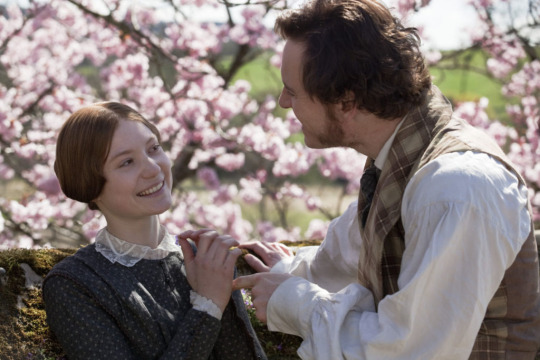
Could SJM be using Jane Eyre as a model for Elain's character and hero journey? Yes, I do. Here is why.
Let me describe Jane in a nutshell for you: she was someone who came from a difficult and isolated childhood and who used her meekness and reserved nature to fit into circumstances. However, we learn she is a smart, witty, innocent, stubborn, and feminine female protagonist. Despite all the societal and religious pressures to marry a husband, Jane was insistent she would only marry for true love.
“I am no bird; and no net ensnares me; I am a free human being with an independent will.” ― Jane in Jane Eyre “Shall I tend to my little garden forever?” When Nesta flinched, Elain said, “You can't have it both ways. You cannot resent my decision to lead a small, quiet life while also refusing to let me do anything greater.”
....when I was reflecting on that, I was hit with a wow that is Elain Archeron if I have ever seen anything.
Jane Eyre is a story of Fate, Love, and Autonomy. Just like Elucien.
Without getting too wordy, let me summarize a few things for folks who never read the novel.
The connection described between Jane and Rochester is one of fate. Jane and Rochester fall in love from the start because he treats her as equal, but their marriage is thwarted because Rochester is still married to Bertha Mason (the madwoman in his attic).
Even though she loves him, she has complicated feelings about marriage. She is afraid of the restraints and expectations that will be placed on her if she were to marry.
She leaves him for some time and they endure a long period of separation. In that time she meets St John who will also propose to her, but is meant to represent dutiful marriage without true love and warmth. St John was described as a cold love, whereas Rochester was described as fire.
Eventually, she realizes she wants true love above all else, and returns to Rochester. He has lost his wife by then and it is only then that they are free to finally marry and live together as equals in love.
OKAY. That is definitely an oversimplification but I needed to lay it out for our road map. Let's compare now.
Elain and Lucien shared a fated connection created by the Mother with their mating bond. We also know that a long period of their relationship is defined by their separation where Lucien goes to find Vassa and maintains his distance from Elain out of respect of her feelings.
We know Elain likely has complicated feelings about the bond. She says to Feyre, "I don't want a mate. I don't want a male." She is resisting the bond with Lucien. While we don't have her POV yet, I imagine it has to do with resisting something that she doesn't understand, that is taking away her autonomy in love, and influencing her fate for her.
Elain is likely also going to have two marriage prospects, just as Jane did. We know of her engagement to Graysen, who was described as "kind enough" by Nesta and later rejected her horribly. This marriage would have been similar to St John - one more out of duty for status and safety and marked by coldness. Whereas we have Lucien, with fire in his blood, and a warm personality, which is what Jane described true love to be like.
What is keeping Elain and Lucien apart? Bertha Mason.
Bertha, Rochester's wife and mad woman in the attic, was a symbol of Jane's suppressed emotions and inner conflict in regards to Jane's marriage to Mr. Rochester. She represented what Jane feared the most of traditional marriage at that time--becoming trapped and isolated and mad by the female expectations of society and religion.
It was only once Bertha was gone that they could have their Happily Ever After. (It's important to note she perished in a fire.) Her absence was a physical representation of Jane losing her reservations about marriage and fully becoming sure of herself in confidence, status, and her DECISION to pick to true love.
Which tells me that Elain will return and love Lucien only after her own reservations of the mating bond are addressed. Maybe fire will even be involved/symbolic burning of their obstacles (which would be so fitting for our fireling). I think there is also an added layer that Elain wants more from life than what is expected of her by the Inner Circle, which is hinted at throughout ACOSF.
SJM told us herself in an interview:
“I’m not going to say if I am exploring it in future books or not, but it definitely offers a wealth of things to explore with this concept of freewill and what is true love. Is it something that’s destined? Or is it something that you make? Is it both?”
If she is truly influenced by Jane Eyre, we know the answer. When it comes to Elucien, it's both.
Other Symbols of Jane Eyre in Elucien
A few more interesting parallels I found:
Mr. Rochester gifts Jane a pearl necklace upon his first proposal. Jane refuses to wear it and even leaves it behind. "I left that; it was not mine: it was the visionary bride’s who had melted in air." Notice she rejected not because she doesn't like Rochester or the gift itself, but because what it symbolizes. A bride.
Lucien gave Elain pearl earrings for Solstice. She could barely thank him and we never know if she wears it. I am going to infer that Elain rejects the gift (with silence and indifference) because she is terrified of what it represents...of her accepting the bond between them. I found it so interesting SJM chose to use pearls and have them react very similarly.
Jane Eyre is filled with literary symbols of Fire vs Ice, with fire representing passion and true love, and ice representing duty and cold love.
Lucien could very well be a living symbol of fiery, passionate love ("Autumn Court males have fire in their blood—and they fuck like it, too" anyone??) Graysen and Azriel could also be symbols of that "icy, cold" love in comparison to Lucien.
We also cannot forget that Mr. Rochester waited and waited for Jane to return. Just as Lucien is waiting for Elain to be ready.
In Conclusion...
Let me leave you with one more piece of evidence to convince you. In Jane Eyre, Jane says this of Rochester once she has finally decided to be with him:
"All my heart is yours, sir; it belongs to you; and with you it would remain, were fate to exile the rest of me from your presence forever.”
In ACOWAR, we have this moment between Elain and Graysen:
"I belong to no one. But my heart belongs to you.” Graysen’s face hardened. “I don’t want it.”
Elain will eventually realize her heart belongs to Lucien Vanserra. And he will give her the true love, peace, and happiness she has always wished for her entire life.
“When I sleep,” she murmured, “I can hear your heart beating through the stone.” She angled her head, as if the city view held some answer. “Can you hear mine?" He wasn’t sure if she truly meant to address him, but he said, “No, lady. I cannot.”
Lucien's heart already belongs to Elain. Likely since the moment their bond snapped, which is why she can hear his heart.
In their book, Elain will give her heart to Lucien, as it belongs to him. And has likely always belonged to him.
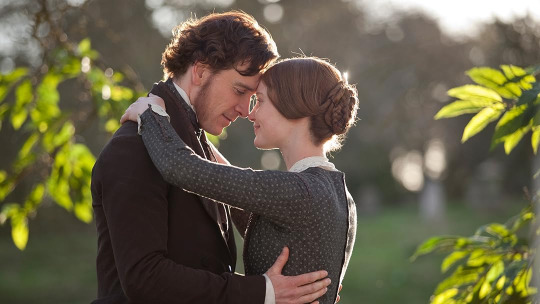
#elucien#elucien meta#pro elucien#elain x lucien#elucien supremacy#jane eyre x elucien#i will never stop loving jane eyre#the parallels KEPT GOING WITH THESE TWO#elain archeron#lucien vanserra
111 notes
·
View notes
Text
For my literature course I’m taking the main book we’re supposed to dissect is Jane Eyre and for the LIFE of me I cant stop thinking about how well L and Light suit the dynamic of Jane and Mr Rochester. Defined by their different social standings and power dynamics yet is equalised by their intelligence, how that leads them to breaking the barriers that separate them. Jane insulting Mr Rochester through brutal honesty and Light insulting L because he doesnt fear him, you see it, its there. Mr Rochester and L both playing into it because they like that someone else is on their level and understand them on a fundemental level — someone they’re not bored talking to, someone they dont have to pretend with.
Other roles in the novel I can see being fulfilled wonderfully is BB being Bertha — both trying to constantly kill the person they’re intertwined with, be it marriage or trying to immulate them; very entertaining idea of L just shoving BB’s murderous ass in an attic in an attempt to ignore it like Mr Rochester did. Watari is OBVIOUSLY Mrs Fairfax I will hear nothing else. Adele would be Near, though I wonder how I could include Mello and Matt in an AU like that.
Maybe an idea to play with once I get my current draft published and my next idea written because I am HORRENDOUS at scheduling.
#Hopefully I get this death note draft published this weekend and the next one in the upcoming month#they make me severly ill can you tell I love literature?#I wonder how Light would be in a Jane Eyre au because they do have similarish qualities in certain areas#maybe his Helen can be Misa or Matsuda#I’m leaning towards Matsuda#maybe Misa can be similar to St John or just fill a similar narrative function#cains rambles#death note#Lawlight
19 notes
·
View notes
Note
Harry/Snape Jane Eyre au when?
Harrymort Jane Eyre au when?
i'm afraid, anon, that neither of these will pop, because the series imagines a very different madwoman in the attic - or, well, portrait - causing carnage for her husband's new paramour.
which is to say, the best mr rochester in the world of harry potter...?
orion black.
#asks answered#asenora's opinions on ships#unhinged and deranged ships#orion black#harry potter#tom riddle#either or both... i'd read it
16 notes
·
View notes
Note
This might be a weird question to answer buuuut… I want to write a story where the more interesting thing is happening the main character…’s best friend. So one of the major events is happening to the other character. Like if we read about Gale in THG and what his life was like while Katniss was in the Games. Do you think that can work? Or will everyone be like “the other character should have been the main one”?
Just very theoretically with no additional info - I think it COULD work. I guess it depends how it is handled.
Everyone is potentially interesting, and the stories you think you know would be very different from a different POV. But, you know, obviously, things have to happen to the main character for it to be A BOOK, and the main character can't be a different person -- the main character IS the main character. If Suzanne Collins was writing THG from Gale's POV, about what was happening to Gale while the hunger games was going on -- GALE would be the main character of that book!
For example: LONGBOURNE is about the servants at the homes of the characters in Pride and Prejudice. But it isn't like their story ISN'T INTERESTING. "Major events" are also happening to THEM, they just are different from the major events we know are happening to Darcy and Elizabeth.
WIDE SARGASSO SEA is about the "mad woman in the attic" who is married to Mr Rochester from Jane Eyre. In Jane Eyre, she is really barely mentioned and not explored at all -- very much a minor character. But in WSS, we see the world in an entirely different way -- she IS the main character of her own story.
So I assume you are NOT writing about a story we already know. You're writing a brand-new story with characters we have never met before -- you just think that one of the side characters is doing something more "interesting" than the main character? Well - why did you make that choice? It's not a problem or anything -- just I have to assume that the character your book is about is ALSO interesting and compelling, even if they aren't doing something "big", right?
15 notes
·
View notes
Text
A Defense of Edward Rochester
Many defenses of Mr. Rochester in Jane Eyre have been written already, but I feel they’re important to remember when reading the book. It is easy to judge his actions towards his wife based on modern sensibilities and norms, but the historical context of the story is extremely important to note when evaluating his actions.
First off, in the 1840s, insanity was not grounds for divorce. So he wasn’t lying when he said he was trapped in that marriage; there was no legal way for him to leave her.
Also, in the 1840s, asylums were basically worse than death. Inmates were treated as less than human, and often chained, beaten, and sexually assaulted.
Plus, look at Bertha’s actions whenever she escapes from the attic:
1. She tries to murder her husband by burning him in his bed.
2. She tries to murder her own brother.
3. She sets the house on fire by trying to murder Jane, thinking she’s still in that room.
This woman is a 3-time attempted murderer. Regardless of motive, that just … is not okay. Yes, perhaps she’s not in control of her actions; perhaps her insanity is doing these things, not her conscious self. But still. She’s a danger to everyone around her. And considering the medical achievements of the time, there was no hope that she could ever be cured.
Rochester had every reason to send her to one of those asylums after she proved how dangerous she was. But he didn’t. He kept her locked in the house and looked after by a 24/7 caretaker where she was guaranteed safety, food, water, and decent company rather than abuse, torment, and starvation. That was in fact the better and kinder option. Nowadays, such an action would be horrifying BECAUSE divorce and professional mental healthcare are options. But not back then. Considering his particular situation, he did the most honorable thing that could possibly be done with regard to her.
And his anger towards her is not because of her madness. He himself tells Jane that if she were mad, he would still love her and be devoted to her forever. Bertha cheated on him during the first years of their marriage. He was ready to love and care for her all his life, but she betrayed his trust completely. You can’t fully fault him for having mistresses when she broke their vows of faithfulness first. Also, considering he was not told about her insanity ahead of time, he had absolutely no idea what he was signing up for with her. He wasn’t prepared to deal with someone who was mentally disturbed. And he mentions he literally contemplated suicide during the marriage; that’s how miserable she made him.
Whenever he talks about her, he rarely calls her “my wife.” He always refers to her as Bertha Mason, never as Mrs. Rochester. He’s so scarred by what he’s been through with her that he’s literally in denial and trying to convince himself that they’re not married. His behavior really reflects that of someone who has experienced spousal abuse and is unable to leave. It’s not pretty.
Yet, let’s not forget their last-ever moment together. She has ruined his life completely. Her existence prevented him from marrying the love of his life and doomed him to be alone forever after Jane left him. You’d think he would leave her to burn after all the harm she caused him, her brother, and Jane.
Instead, while still in love with another woman, and knowing her death would give him a chance with Jane, he goes back into a burning house, loses a hand, goes blind, and very nearly dies trying to save her life. She has done nothing to earn this act from him. But he still does it. Because his experience with Jane has taught him that, in spite of the unfair hand he was dealt, and his understandable anger towards her, Bertha is still his wife. He is still her husband.
What’s more, he chose to become Adele’s guardian. There was no proof that she was his, and he disliked children. Yet he still took on the responsibility of taking care of her and took the time to give her presents, hire a governess for her, and make sure she grew up in a safe environment. That really shows his good character.
Also, he completely turns around after deceiving Jane and concealing Bertha’s existence. When Jane learns the truth, Rochester stops all lies and comes clean, telling her everything and being completely honest. Honesty is one of the core factors of a healthy relationship and though Rochester badly fails the test early on in his romance with Jane, he does redeem himself on that front. And when she leaves him and he is heartbroken, he doesn’t take his pain out on anyone (unlike a certain “hero” from Charlotte Brontë’s sister Emily’s classic book). He arranges for Mrs. Fairfax to be comfortably retired and for Adele to go to school (decisions which very likely ended up saving both of their lives considering that Thornfield burned).
Moreover, when Jane returns to him, he has become selfless enough to believe she’d be better off without him and encourage her to marry St. John. He doesn’t try to possess her or keep her, like he used to. He gives her the freedom to choose.
And, being financially independent, Jane now has the power to live without him. Her marrying him is a choice, not a forced or coerced action.
The great thing about their love story is how it evolves from unhealthy to healthy. They both experience individual growth when separated, and get back together more compatible than ever before.
So, despite what haters may say, the great Charlotte Brontë’s text contains more than enough evidence that Rochester IS good enough for Jane and that he DOES deserve her.
#jane eyre#mr rochester#edward rochester#bertha mason#adele varens#literature#classic books#classic literature#thornfield#pro mr rochester#anti hero#jane x rochester#charlotte brontë#lit#literary analysis#classic novels#british literature#1840s#19th century literature#gothic novel#charlotte bronte#bronte sisters
70 notes
·
View notes
Text
knowing that rebecca was heavily inspired by jane eyre is interesting because i see how bertha mason and rebecca de winter, despite occupying the same narrative role of antagonists, stand in contrast to one another in certain ways. bertha was someone whose origins were "questionable", she was not very intellectual and also mentally ill. rebecca on the other hand came from "good breeding", and her mind was strong, so strong that she was easily capable of bending everyone else to her will. bertha was the mad woman trapped in the attic, but rebecca was the whole house itself, tall, beautiful and imperious, and she was never trapped, it was the others that were trapped within her, their fates at her hand. when bertha burns the house down it gives an opportunity for the others to start anew, but when manderly (one with rebecca) burns down she takes everything with her, the destruction making the soil barren for anything else to grow.
of course that isn't to say the ending of both novels are solely the result of each women's wits where the mentally strong one succeeds and the mentally ill fails. i attribute the ending instead to their husbands. mr. rochester despite his loathing for bertha still tried to do what he could to keep her alive and safe (by 19th century standards), so he was given the possibility to move on and start over with jane once bertha was gone. maxim also loathed rebecca, but he wasn't as patient and so he ended up killing her, and in doing so he invited rot upon himself and doomed any chance of future happiness he might have, even being able to escape punishment from the law did not mean he could escape rebecca.
16 notes
·
View notes
Text
I was reading the preface to an anthology of Alexandre Dumas's most Gothic works once and the man who wrote it said that much of the focus on (female) sexuality in Gothic literature is directly inspired by the Marquis de Sade's work. He argued that de Sade was the first one to say that women can enjoy forbidden sexual practices (kinks), actively desire a form of sexuality that contravenes the moral order (at the time: heterosexual exclusive relationship with one's husband with the goal to have children)
BUT IS IT REALLY THE CASE?
Looking back at Gothic literature as written by female writers I do not think this to be true.
Take Jane Eyre for example. Jane Eyre says a lot about womanhood. Jane Eyre is about a woman navigating between two models for womanhood: the model a sexually repressed and sexist society tells you to aspire to (that's Helen Burns), and an anti-model society tells you you should NOT aspire to, that links women to their most basic animal instincts to the point of self harm (that's Mr Rochester's mad wife in the attic). Jane Eyre eventually rejects both models and creates a synthesis; that of a whole woman who lives for herself and chooses for herself and tries to do right by herself and by the people she cares about
Take Wuthering Heights. It's a story about overcoming a family cycle of abuse. The story makes a point about how women and girls can be trapped in unhappy family situation and that restricting freedom of movement and being groomed by male relatives do harm you in the long term; but the second Cathy does manage to break free and find happiness for herself.
Take The Haunting of Hill House. Eleonor falls prey to the house for one very reason: because her family situation (having to care for a neglecting parent well into her adult life, never leaving the home) left her very insecure about herself and completely inhibited her sexuality (as reflected in her attraction to Theodora and the complicated relationship of attraction/repulsion they share).
Female Gothic literature usually makes one point: the household is a place of oppression for women. Female oppression in the household takes three forms: economic oppression, physical oppression (restriction of movement) and sexual repression. Those novels make one point pretty clear: both the thesis (what society tells women they should aspire to) and the antithesis (taking that social model and reversing it entirely isn't liberating as you just end up encouraging misanthropic and self-harming instincts - that's what the first Cathy did in Wuthering Heights, that's what Eleonor under the influence of the House did, that's Mr Rochester's wife) are bad. the real path for liberation is to create a synthesis of those two models in order to find a place where you feel intellectually and sexually satisfied with yourself - like Jane Eyre and the second Cathy did.
This is very far from the Marquis de Sade's work. The Marquis de Sade took the model a sexually repressed, conservative, sexist society imposes on women and reversed it entirely to argue women were actually just like animals. The Marquis de Sade's books, which are all badly written, by the way, all depict women in different settings - women being raped, women being degraded, women being humiliated, women involved in bestiality, women being treated like animals by the men who rape them. The Marquis de Sade also argued that sexual relationships with women were better when women didn't consent. He argued that whatever gets you off was good; and therefore, that rape was good; and that men should rape more, actually.
This is pretty far from what female Gothic writers argue when they talk about womanhood.
BUT IS THAT ALL?
If the female Gothic is pretty far away from the Marquis de Sade's work, we can't really say the same about the male Gothic. What the man who wrote the preface to that Alexandre Dumas edition argued was that the Marquis de Sade said women could be attracted to their tormentors; women discover a part of themselves through the abuse they are put through and can enjoy a newly-found sexuality that way. Now, that is of course sexist, but that is indeed a theme often explored by male Gothic writers. I think we find some remnants of that in the Phantom of the Opera musical. It's the theme that pervades the Music of the Night (Close your eyes and surrender to your darkest dreams, purge your thoughts of the life you knew before, ... open up your mind, let your fantasies unwind, in this darkness which you know you cannot fight). I think this is also the theme that is being explored by the new Nosferatu movie, which is very different from the original 1922 Nosferatu movie on that front.
tl;dr male Gothic literature and female Gothic literature are very different when it comes to depicting womanhood. while I think female Gothic writers talk about women and sexuality completely differently from what the Marquis de Sade did, I think a case can be made about the Marquis de Sade influencing male Gothic writers to some extent. that extent has to be put into perspective, though. there is a difference of degree in your sexism, between arguing men should rape more and rape is good, actually (like the Marquis de Sade did); and saying women can be attracted to male villains turned abusers
2 notes
·
View notes
Text
Thornfield Hall, Manderlay, and Louis de Pyromaniac du Lac
I wanna talk about Louis' depression, Anne Rice's grief, and the element of fire in a few iconic Gothic romances/horror stories. (Trigger warning for suicide.)

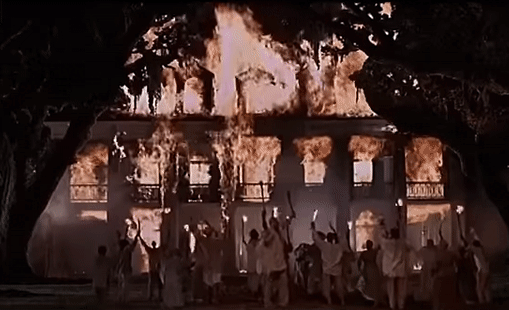

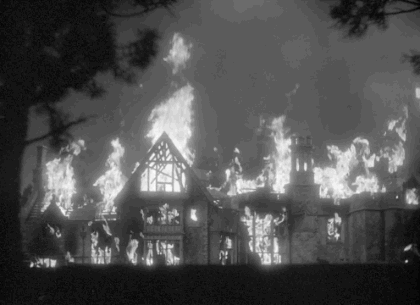
Bar none, my favorite thing about Louis is his obsession with fire, and how it's linked to his abuse, mental instability, and trauma.
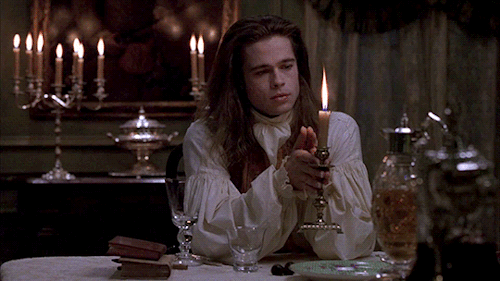

It's so neat how AMC's Louis chainsmokes when he's stressed, and has a hilarious attachment to the incinerator.


His fire obsession's a whole meme at this point, & everyone's excited for Louis going ham with fire in Season 2. I can't wait to see how AMC handles his most iconic book/film moment(s).
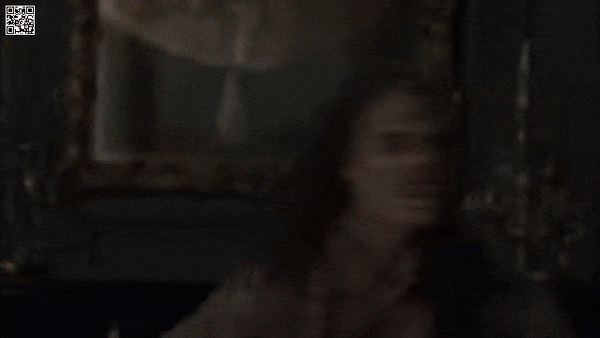
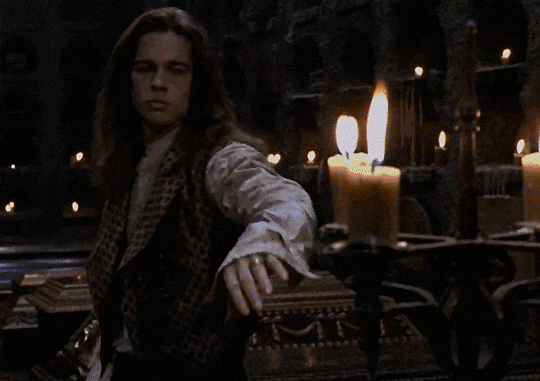
But I was rereading Jane Eyre, and thought alot about Bertha Mason (Mr Rochester's archetypal crazy wife in the attic), and Mrs. Danvers from Rebecca (which was inspired by Jane Eyre). And they got me thinking about fire and suicide in the Vampire Chronicles, so walk with me a bit.
Louis is called the most "human" of the vampires, because of how weak he was, compared to other vampires his age (and even younger). His rat/animal blood diet was tantamount to an eating disorder that heavily stilted his growth as an immortal, and for the majority of his life he lacked many of the Gifts vampirism afforded his peers (Mind Gift, Spell Gift, Killing Gift, etc).
However, shockingly enough, AMC decided to give Louis one of their most potent powers: The Fire Gift (pyrokinesis).
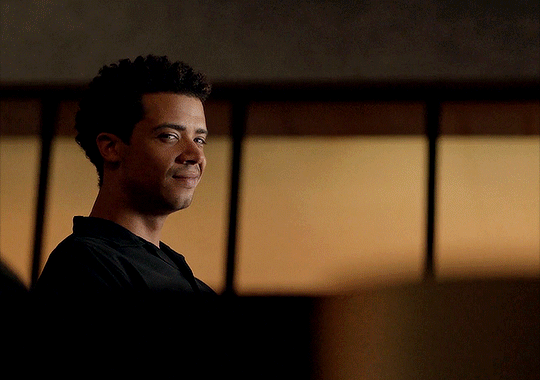
In the books it was explained that vampire blood is flakey & highly flammable, and only the oldest and/or strongest of vampires could withstand fire without serious injury or death--let alone use the Fire Gift to any significant degree--hence: BAMF Akasha using it as her signature attack in QotD. 👑
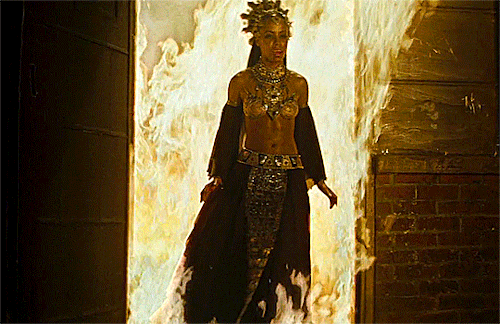
This seriously begs the question about where this show sits in the canon timeline, because book readers know that Louis only gains the Fire Gift, Cloud Gift, Mind Gift, etc etc after the events of Merrick, when Louis tries to commit suicide, and to heal Louis' burns, Lestat gives him a huge infusion of his powerful blood (having fed at length from Akasha in QoTD, and also God/Jesus in Memnoch.)
Lestat's super!blood healed Louis' burns and saved his life, but it also drastically & permanently changed Louis' body, making him more vampiric than he'd ever been, seriously augmenting his powers. This was something Louis had adamantly been trying to avoid--every time the Children of the Millennia/Coven of the Articulate met up, they all offered Louis infusions of their ancient blood, trying to help him power up, and every time Louis refused them all.
Louis retaining his humanity was so important to him, not only because of the Catholic Guilt he felt being a blood-drinking killer, but also because being physically weak allowed him one ultimate ace up his sleeve: if he ever got the courage to end his life, he could always rely on going into the sunlight, and burning to death.
So, while AMC's dust particle effect is very cool, I'd rather see vampires on FIRE--even though the ashes to ashes visuals are rather apropos.
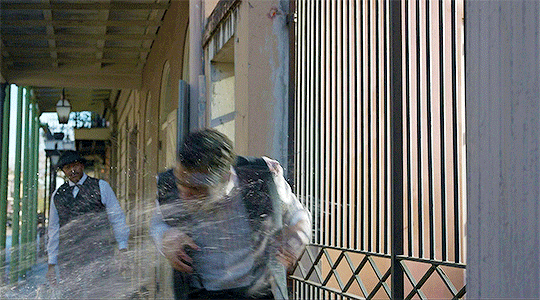

Regardless, I was also thinking about all the other people & places Louis set on fire; and how it all ties in with the Gothic literature Anne Rice was CLEARLY inspired by--namely: Jane Eyre & Rebecca.
Cuz we know Anne Rice wrote Louis and his grief over losing Claudia as a self insert, as a way for her to try handling her own grief over losing her daughter. But she started hating writing as Louis, and being stuck in that depressive mindset, so AR switched to writing from Lestat's POV instead, as a more fun and carefree character for a few books--until Lestat had a crisis of faith in Memnoch and goes into a coma. We then get Armand's book, where in TVL Armand tries to commit suicide by walking into the sun after Lestat gets Veronica's Veil from Memnoch (i.e.: proof that God exists, from the Devil). Immediately after this is Merrick, where Louis enters another depressive episode, as he waits vigil for YEARS beside Lestat, who lies on the floor of a cathedral in a coma. As Louis mourns, he finds Claudia's diaries, which reveal just how much she hated & resented him, and he starts being haunted by Claudia's ghost. By the end of Merrick, Claudia's ghost has convinced Louis that he's worthless, and he agrees.



Suicidal ideation is HEAVY in both Jane Eyre and Rebecca. Mrs. de Winter is almost talked into jumping from the window by the housemaid Mrs Danvers, who hates that the widowed Maxim de Winter remarried (forgetting his first wife Rebecca), and gave Manderlay to the new wife--a girl half his age with no clue how to be a "proper" lady of the estate.
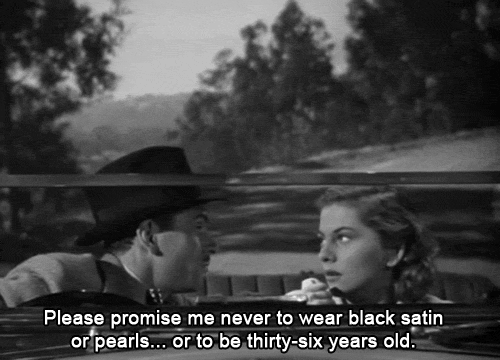

In Jane Eyre, Bertha Mason is literally insane, and was locked up in Thornfield's attic, until she escaped and set the place on fire, then jumped off the roof to her death. In the 2006 BBC version, Bertha sees an owl (a nocturnal bird) fly off the roof, so she follows it; like a free bird taking flight.
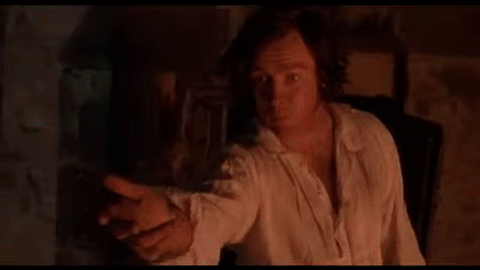
Who else does this in IWTV? PAUL with his birds. (Not to mention the PTSD from Louis' drop in Ep5, which would've definitely killed a normal person.)

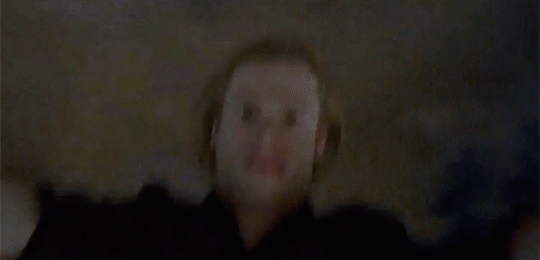
For years, I thought Claudia's ghost was just an apparition: either one of the demons Lestat unleashed while fleeing Hell in Memnoch, or more likely as a manifestation of Louis' guilty conscience, as his mental state got increasingly worse as he read her journals; on top of him being scared Lestat was dying. But then Blackwood Farm introduced Goblin, and all the later books had prominent vampire ghosts that proved that vampires (and aliens, lol) have immortal souls that can linger. So the ghost was legit, and so was Claudia's deep-rooted hatred for Louis.


I've already said how I think IWTV is a story about (failed) marriages and parenthood dynamics, the power imbalances that ensue, and the resentments that fester. But so are Jane Eyre & Rebecca. At the heart of ALL of them are mental illness & houses on fire. Bertha Mason was violently insane, but she was sane enough to realize that Mr Rochester was tryna marry another woman right under her nose, when it was HER dowry money that bankrolled Thornfield, as his first wife. So in the 2006 version Bertha lights Jane's wedding dress on fire, taking the whole mansion down with her. (In the book she just tears up the dress & veil, then starts the fire.)

In Rebecca, it was Maxim's first wife Rebecca who was cheating, but the (nameless) second wife lived under her shadow & the ghost of her memory--embodied by Mrs. Danvers, who hated her guts, and fed into her deep insecurities over being married to a widower who hadn't gotten over his first wife Rebecca (*cough* little did they know though~! XD). After failing to talk the girl into killing herself, Mrs Danvers had a psychotic break, and set Manderlay on fire, dying in the blaze (joining her beloved Rebecca).

Taking the Gothic horror & suspense out--or, hell, INCREASING it--one could easily spin this so that JANE was the one who started the fire when she learned about Bertha in the attic and ran away from Thornfield (in some adaptations the fire happens the same night she leaves). One could also say that MRS DE WINTER burned down Manderlay after cracking under the pressure of becoming a married lady. Both of these second wives were driven crazy by ghosts of the past, and burned down the mansions that had become their tombs.

Cuz I mean...Louis is Lestat's second wife/husband, after Nicky killed himself in a fire. 👀 And Louis and Claudia literally watched as they burned Lestat's sidechick/third wife Antoinette alive, so.... 🔥

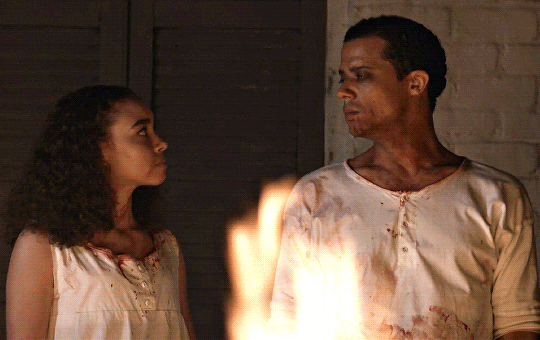
TL;DR: I think Anne Rice must've been struggling with a lot of suicidal thoughts around the time she wrote The Vampire Armand (book 6) and Merrick (book 7), to have both its characters do the same thing, one right after the other. Vampires and their vulnerability to fire/sunlight were just metaphors for very real personal issues. After writing IWTV, she walked away from Louis, burying her depression by writing more books as the sunny Lestat, who suntans for fun and is immune to fire by the end of QoTD. But in the back of her mind, AR might've felt guilty forgetting about her grief (Louis forgetting about Claudia--willfully forgetting about Bertha, Rebecca, etc....). So the ghost of this guilt came back with a vengeance in Merrick, as Claudia unleashed all her vitriol on Louis, and he hated himself to the point that he was convinced to light himself on fire--the sole reliable escape from misery he had left.
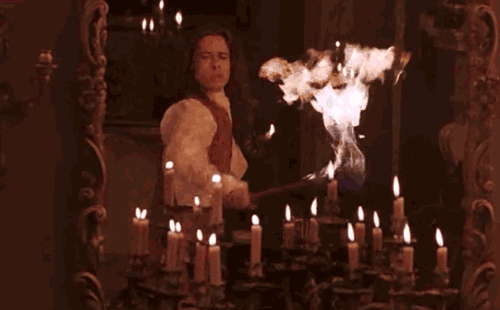
#louis de pointe du lac#loustat#interview with the vampire#tw: suidice#tw: sucidal thoughts#tw: sucidal ideation#jane eyre#alfred hitchcock's rebecca#must see tv#Pyromaniac du Lac#iwtv tvc metas#gothic horror
67 notes
·
View notes
Text
A Long Fatal Love Chase, by Louisa May Alcott (spoilers)
This book was quite the thriller, as promised, though it gave me more Jane Eyre vibes than The Tenant of Wildfell Hall. Mrs. Tempest reminded me more of Helen Graham than Rosamund, with her determination to fix Phillip and her captivity being centred around her son. Because Rosamund came from an unhappy, unloving home, she seemed very Jane Eyre and her indifference to red flags seemed more excusable. Honestly though, don't go off with a man who reminds you of Mephistopheles! Rosamund also had a indifference to finery which was very Jane.
All three women are staunchly but realistically moral, I like that both Jane and Rosamund waver because of love and yet resist in the end.
Fortunately, Rochester is much more redeemable than Tempest, but I liked that Ignatius was a much better man than St. John River! He was great. I love when he shot that bird just to prove he was awesome and then refused to duel Tempest. It was nice to have a moral man to match the moral woman. Also, first time in a long time that Catholics have been allowed to be good people in any novel I've read! (Looking at you Charlotte Brontë and Elizabeth Gaskell)
Rosamund finding out a year in that Tempest was married and running away did seem a bit like a Jane Eyre AU... And I do think Jane would have done the same thing. But Rochester would have let her go.
The slow death of Rosamund's love as she discovered worse and worse things about Phillip was very much Helen Graham, I guess the biggest difference was that Philip was never that terrible to her, as Arthur was to Helen.
I was really hoping that Rosamund would just live happily with Lito, Ignatius, and Mrs. Tempest and Phillip would die, so the ending was sad, but it was very dramatic. I'm glad her grandfather finally regretted what he had done.
Also, it had a man named Willoughby, now I've read three novels with Willoughbys.
Thanks for the suggestion @the-mad-woman-in-the-attic, I loved it! The only problem was that I read it very fast and then didn't have anything else to read all afternoon.
#summer reading interlude#a long fatal love chase#louisa may alcott#now on to The Hobbit#jane eyre#the tenant of wildfell hall
28 notes
·
View notes
Note
This is weird of me but you said you're reading Jane eyre and it's my favorite book (it does get better in the sense that her whole upbringing is so rough and depressing) and so many people Don't Get It because they're like oh this is a weird relationship and Rochester is a dick and Jane is so meek but I feel like you'll get it, but I feel like it's worth saying that Rochester IS a HUGE DICK but Jane is NOT MEEK she's WEIRD AS SHIT, I feel like that gets lost in the historical context A LITTLE BIT but she's the kind of weird dramatic sassy bitch where most people don't know she hates them, she's a hater, but Rochester does and LOVES it and she loves that he's a dick and the whole book is SO SO much about an abuse survivor deciding what SHE wants, it's basically a female escape and power fantasy. Sorry I'm so so so not normal about Jane Eyre, if you watch an adaptation after watch the Ruth Wilson miniseries not the Fassbender movie ANYWAY I'd love to see your thoughts when you're done okay bye
this is such a funny ask to get because i am LITERALLY reading jane eyre against my will. here's what happened: i got serial reader because i felt like i should read more books (i already did p&p!!), and on my list of "read laters" was jane eyre, and when emily saw it they were like YOU'RE GONNA HATE JANE EYRE BUT YOU HAVE TO READ IT. and i was like why on earth would i read a book i'm going to hate this is over 100k long. but for some reason i am reading it. and so i''ve only JUST finished like chapter 5 which means so far mostly what i've read is poor jane getting abused by a variety of people. and i'm like WHY WOULD YOU HAVE ME READ THIS but they said the same thing that the character jane is very important. and i do get that because she's already yelling at mrs reed for being a horrible old bitch or whatever and so good for her. i am going to keep reading unless it becomes absolutely wretched.
re: the movies...i actually had seen the michael fassbender one a long time ago, but i barely remember it except i know the part about the wife in the attic and also i remember thinking it was boring and confusing. i will not WILL NOT watch the other movie because even though i kind of fell in love with ruth wilson watching HDM, i have become absolutely radicalized against the very SIGHT of toby stephens's face thanks to pjo passions, and i absolutely refuse to look upon him because the very sight of him fills me with revulsion and rage second only to b*nedict c*mberbatch. sorry. i also read an article that was like, the movies can never be good anyway because they can't break the fourth wall the way the book can in narration, they lack jane's Personality. so that's all fine i guess, i can live without adaptations. JUST for you though i will try to make another post when im finished <3
#liz answers asks#anonymous#jane eyre blogging#i guess#thanks for writing in this is genuinely so funny#multiple people warning me that jane eyre SEEMS bad but its really good they prommy
10 notes
·
View notes
Note
Tell me everything about your hunger games aogg au please 👀
First of all, I am so delighted you asked!
Secondly, I read The Holiday Stand In by @lemonluvgirl in which Gale Hawthorne called Katniss Everdeen a kindred spirit and I was so tickled by the idea. Then that reminded me of a Drabble I read, so I scoured THG Drabble collections until I found this and this by @endlessnightlock, which are so enjoyable and I highly recommend!
At this point the idea was stuck in in my head until I was jotting down bits of dialogue, backstory, idea after idea…
My version of Katniss is too pragmatic to be an Anne she’s more of a Marilla at the beginning.
Prim is on the other hand is constantly trying to relate real life to the fiction she’s read.
Effie screams Rachel Lynde
Haymitch is their guardian and is pretty much just Haymitch. But a small part Mathew at heart.
Madge has Diana Berry vibes
The story in my head is centered around Katniss and is a coming of age of sorts: With Katniss able to focus on things outside survival, she learns how to really live…
And because I opened the document and found something I thought captured the essence and made me laugh…
Here’s a peek 🫣 (it’s unedited and subject to hangs - bear with me)
“Can we call you uncle?”
“Prim, we’ve been over this, he’s not our uncle.” Mother and father didn’t have siblings, he’s a cousin of fathers so even less related to us. “We are his wards.”
She wrinkles her nose “Ward doesn’t have such a nice ring to it. It reminds me of wart and those don’t have very pleasant associations.” a flash of recognition passed her face and she continues on excitedly, “Mr Rochester had a ‘ward’, her name was Adele and she was a french, though her parentage was rather dubious” she trails off and a worried line appears on her brow “ but Mr Rochester also had a secret wife living in his attic” she eyed her surroundings suspiciously.
“No such luck here sweetheart” he shifts his attention to me ”Just what kind of company have the two of you been keeping?”
I scowl at the implication “She’s talking about a book.” I’m used to Prim discussing fictional characters as if they were real acquaintances of ours, but I suppose it might be jarring if you hadn’t been used to it “Prim loves to read” I add unnecessarily.
Prim’s ramblings, though absurd, have hit on a valid point: what do we really know about Haymitch Abernathy?
“It’s Jane Eyre and oh! It's the loveliest. I do enjoy a good novel, though I prefer a romance. There is something so hopeful about a romance” Prim continues on…
I will also admit that I am in over my head. Send suggestions or help!
Seriously! Thank you for asking!
35 notes
·
View notes
Note
sterek Jane Eyre werewolf au... Scott as Helen dying in Stiles' arms, being the first who's kind to him and traumatizing him forever. Stiles being hired to watch over little Eli. Derek being broody and dark, watching Stiles from afar, then finding solace in him. Stiles being the only one Derek trusts in a house full of posh guests. Peter or maybe Jennifer being his secret in the attic. Derek confesses that he's a wolf. Them marrying, then Stiles running away. Parrish as St.John trying to convince Stiles to marry him. THE FIRE. the FIRE. Derek going feral from it and losing his mate, and Stiles is the only one who can reach him. Jane Eyre sterek au is top tier, it fits so well
more proof that sterek Jane Eyre werewolf au is perfect: “All my heart is yours, sir: it belongs to you; and with you it would remain, were fate to exile the rest of me from your presence forever.” 💔 “No man was ever nearer to his mate than I am: ever more absolutely bone of his bone and flesh of his flesh.” IT'S THEM 💔 "My very soul demands you" 💔 “You, Stiles, I must have you for my own – entirely my own.”
oh my god. HEDWIG. HELLO!!!!!!!!!!!!!!!!!!!!!!!! the way the werewolf reveal + peter reveal FITS SOOOO WELL???? also the scott as helen is making me cry so much omg, that IS SOOO PERFECT AND THEN LITTLE ELI AHHHHHHHHH.... although it'd hurt a little if it was like mr rochester and he has to be a little mean to sweet little eli.. the most gorgeous line.. if i had the money and face itd be as hard for you to leave me as i am to leave you (very very not verbatim).. the peter reveal happening as the same time as the werewolf reveal.. an argent ruining their wedding... WHEWWWWWWWW
god. the way the werewolf reveal is so fucking perfect i cant believe it took me this long to also think about it LIKE. the rumors or derek being. supernatural and broody and crazy. a crazy uncle who died but is also alive? strange howls and growls inside the hale castle.. the way it's sooo gothic horror too.. whew....
derek having scars instead of being blind though <3333 hedwig you have truly convinced me of scarred derek bc of treasure like i need scarred alpha possessive sweet derek in a way thats concerning to feminism
anyways. jane eyre sterek au <3333 she is so so perfect it makes rewatching jane eyre so much more fun for me! and also cause i just love governor stiles so so much, i have like a million governor stiles au !!!!!!!!!!!!!!!!!!
18 notes
·
View notes
Text
I think I cut Mr. Rochester a lot of slack, because when I first read Jane Eyre, I was burdened to live with two extremely unpleasant, nasty, and unpredictable people (my parents).
So instead of empathizing with the “mad” wife, who is being fucking forcibly confined by someone with a lot more social and economic power than her, I was like “Yes, Mr. Rochester, you engage in self-help! Don’t accept the shitty family fate has dealt you!”
Which is kind of a wild take, objectively, but like… if I had had the option of locking my parents in the attic and starting over with new people I semi-entrapped into the role of being my parents, I would have been very tempted.
But I was 11, and Canadian houses don’t really have true attics. So I read Jane Eyre. Twice.
Harrowhark Nonagesimus would have been an absolute icon for me.
2 notes
·
View notes